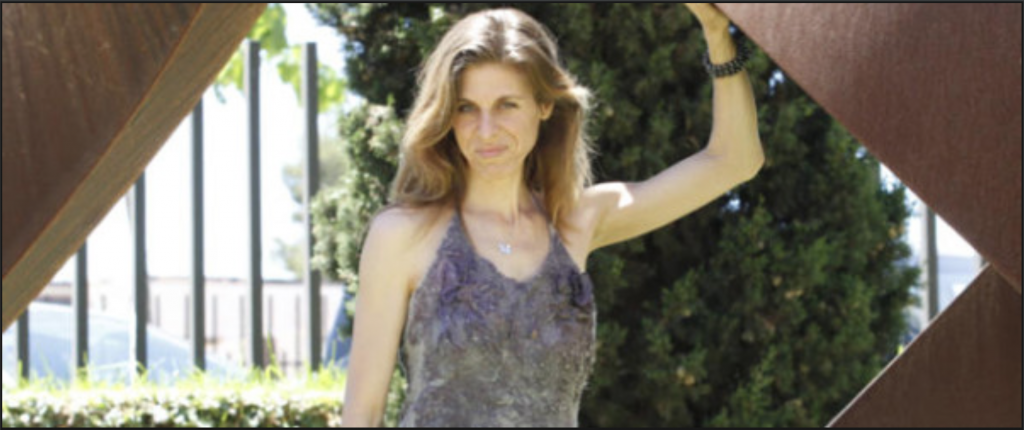 Original article by Mihály Czékus copyright by HangzasVilag.hu
Original article by Mihály Czékus copyright by HangzasVilag.hu
http://hangzasvilag.hu/zeneszprofil-muriel-grossmann/
Translation by Katalin Parti
Musician Profile
Saxophonist-composer Muriel Grossman is recognized as a real cosmopolite. For she was born in Paris, spent her childhood in Austria and lives in Ibiza for more than a decade now. She throws 150 concerts a year on the average. Jazz, although being a niche genre, there might not be another genre manifesting in such a wide range. There is a branch within jazz called spiritual jazz. Its pioneer is said to be John Coltrane, as that kind of immersive context was identified primarily in his records. After Coltrane, there were a number of jazz performers playing this way. Among them, there is Muriel Grossmann whose career is going to be introduced below.
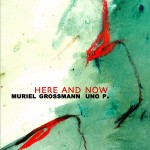
Here and Now (2008) is Muriel Grossmann’s first album, clearly calling for the attention of both experts and audience. The composition of the band is already a curiosity, as saxophone and drums are not typically paired in a band. This record could be addressed as a real pathfinder. It is obvious that Grossmann knows John Coltrane’s and Ornette Coleman’s work. It might be easily assumed from the above facts, that her compositions are not at all from the romantic saxophone based compound. The repertoire consists of eight numbers of average length. The most remarkable items on the record are „Magnetic Universe”, „Interaction” and „Quintessence”. Both saluting the ancestors and bold experimenting are present in the tracks, seeking innovation.
Contributing: Muriel Grossmann – alto saxophone, Uno P. – drums
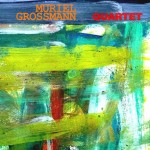
On the record titled Quartet (2008) Grossmann strives for longer, and more immersive compositions, thus providing a wider playfield. As a consequence, a vast amount of the repertoire consists of eight-minute or longer tracks. As it is experienced in the musician’s later albums, she extends this timeframe even further. Grossmann seemed to feel the framework of a duo formation too narrow, thus this record was made with the contribution of her three musical colleagues. It is not easy to identify what is primarily catching our ears. Perhaps the vivid saxophone play? Perhaps the enjoyable assertiveness of the tracks’? There is no simple answer, mostly because Grossmann’s music can have an impact on more levels of consciousness at a time. It can enhance different types of apperceptions.
Contributing: Muriel Grossmann – alto saxophone, Radomir Milojkovic – guitar, David Marroquin – contrabass, Marko Jelaca – drums
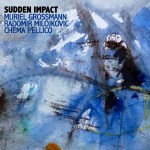
The title Sudden Impact might resemble of the 1983 Clint Eastwood movie Sudden Impact. Although Grossmann’s 2009, same titled record has nothing to do with the movie. Nevertheless it is a very good record, in which the saxophonist is courageously experimenting even with the composition of the band. After the duo and the quartet albums, Sudden Impact, for the sake of diversity, is a trio album. The speciality of the repertoire is that two numbers, already part of the record Here and Now, are listed here too. The first piece „Joachim”, and „Magnetic Universe” in the initial third of the disk are recorded in completely different style. Those who delve into both disks, can decide whether these compositions are better performed either in the first, or the second version. There are nine tracks on this silver colored disk. The performer-composer seems to have decided this time, that she presents her thesis in brief items. Thus, most of the tracks are only between three and four minutes long. Grossmann turns her scope to free- and avantgarde jazz fearlessly. She does this by masterfully creating a balance between the above mentioned two subgenres. She manages to keep the compositions in an alternative groove.
Contributing: Muriel Grossmann – alto saxophone, Radomir Milojkovic – guitar, Chema Pellico – contrabass
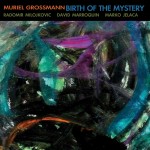
Even the title Birth of the Mystery (2010) suggests that Grossmann composed here along an intense drive. She did not think for a moment, whether she should be empathic with those who do not feel for music in the way she does. She just cannot imagine that depth in music is not to be discovered for the simple minded listener. The musician utilizes the freedom provided by jazz as a genre and she pipes that into intense musical language. Her compositions diffuse so much energy and freshness as one can be sure, that the artist enjoyed even the composing process. The seven-number disk contains brief tracks such as „Breathing” (3:57) and also longer ones such as „Strength” (11:02).
It would be difficult to chose a favourite from the album, for it has such a balanced system and high level repertoire, that contains coequal compositions. Grossmann, through her well thought pieces and their thoroughly composed performances spectacularly draws the picture of the „mystic birth”.
Contributing: Muriel Grossmann – alto saxophone, Radomir Milojkovic – guitar, David Marroquin – contrabass, Marko Jelaca – drums

The album titled Awakening (2013) contains only a few pieces. This five-piece repertoire seems moderate at first glance. In reality, each piece in this record is a grandiose take. Among the tracks, the shortest is the title song „Awakening” with its 9:37’ length, and the longest is „Wien” (14:46). As it was already mentioned above, the deeper Grossmann goes into her career, the longer her pieces become, providing an ever growing playfield. It can well be heard that the musician is splashing in the waves of this role, she plays recklessly, with great joy and unfailing energy. This record which is an expression and fulfillment of freedom, love, and innocence, is a real gift. It is a redefinition of the self, though not the one created by thought or by the consciousness, but beyond the thinking self. Its indispensable pieces are the birth place inspired „Wien”, the smoothly flowing „Peaceful River”, and the final „Ornette”. This album is highly recommended for those who like lengthy musical pieces.
Contributing: Muriel Grossmann – soprano saxophone, Radomir Milojkovic – guitar, Robert Landfermann – contrabass, Christian Lillinger – drums
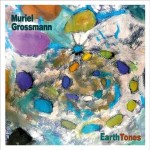
She continues her spiritual musical mission in Earth Tones (2015) recorded last year. While only reading about it, one might tend to a marginalization: esoteric paths are deemed to lead into the moor of superficiality. Luckily, the musician’s messages are free of corny phrases. This album is much more than only one among the esoteric disks. This is true from more aspects. On the one hand, this is a jazz album, on the other, it almost completely lacks enchanting tunes. There is a boundlessly mature, highly controlled, and unearthly passionate musicality instead. The presence of Coltrane’s and Coleman’s spirit are very palpable in this album as well. Grossmann seasons her musical menu with elements of free and avantgarde jazz with a chef’s proficiency. The album deals with themes ever popular today, such as „Hope”, „Wisdom”, and „Unconditional Love”. Grossmann seems to have found the most ideal musical band formation in a quartet: this is her third album in a row together with three more musicians. Moreover, she has not changed a bit on the personnel, she went to the studio with the same musicians she recorded her previous album, the Awakening. Among its characteristics there are the remarkable solos, vivid saxophone plays and a climax of teamwork in musicology. Like in her former album, lengthy items feature this record as well. Moreover, if it can be said, Grossmann added another log from the woodbox. The shortest number is the eleven-minute „Hope”, and the longest is the seventeen-minute long „Sharing”.
Contributing: Muriel Grossmann – soprano saxophone, Radomir Milojkovic – guitar, Robert Landfermann – contrabass, Christian Lillinger – drums
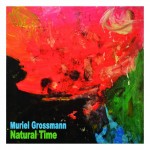
The album titled Natural Time came out this year (2016) and was already introduced for the Budapest audience in a concert. As I have mentioned before, the further Grossmann in her career went, the more immersive and longer her compositions became. There is only one „short” piece on this new record, namely „Your Pace”, with its six minutes. The other numbers in the repertoire represent eight to twelve playtimes.
Music of the Muriel Grossmann Quartet is a powerful experience, spiritual jazz in its best. It reaches for the heart and soul of the listeners, beautiful, moving, ranging from the relaxing and peaceful pieces to the energetic and vital compositions. There is a certain, unexplainable radiance in Grossmann’s music. Although seeing through the musician’s career so far, this unexplainability takes a nice trajectory. The progress of the musician’s conscience is well trackable within the last eight years. While on the 2008 Here and Now she tries several pathes experiencing, on the current record she only follows one path, very clearly. Grossmann, pursuing completeness, managed to getting to know the limits of the human brain and the thought. She comprehended that it is not to be grabbed but to be overcome, and to utilize it for what it is for. She realized how to step into the now, the completeness, the state of consciousness-without-a-choice. The only difficulty here is that Grossmann is not supposed to write an essay about her discoveries, but express herself in musical language instead. Additionally, her creations should not be ended in themselves, and their messages should be decypherable for the audience. The Budapest concert of the quartet was an evidence that Grossmann coded her messages well, as the audience seemingly decyphered them. The strongest themes of the repertoire were the title song „Natural Time”, „Happiness”, and „African Dance”.
Contributing: Muriel Grossmann – alto and soprano saxophone, Radomir Milojkovic – guitar, Gina Schwarz – contrabass, Uros Stamenkovic – drums
